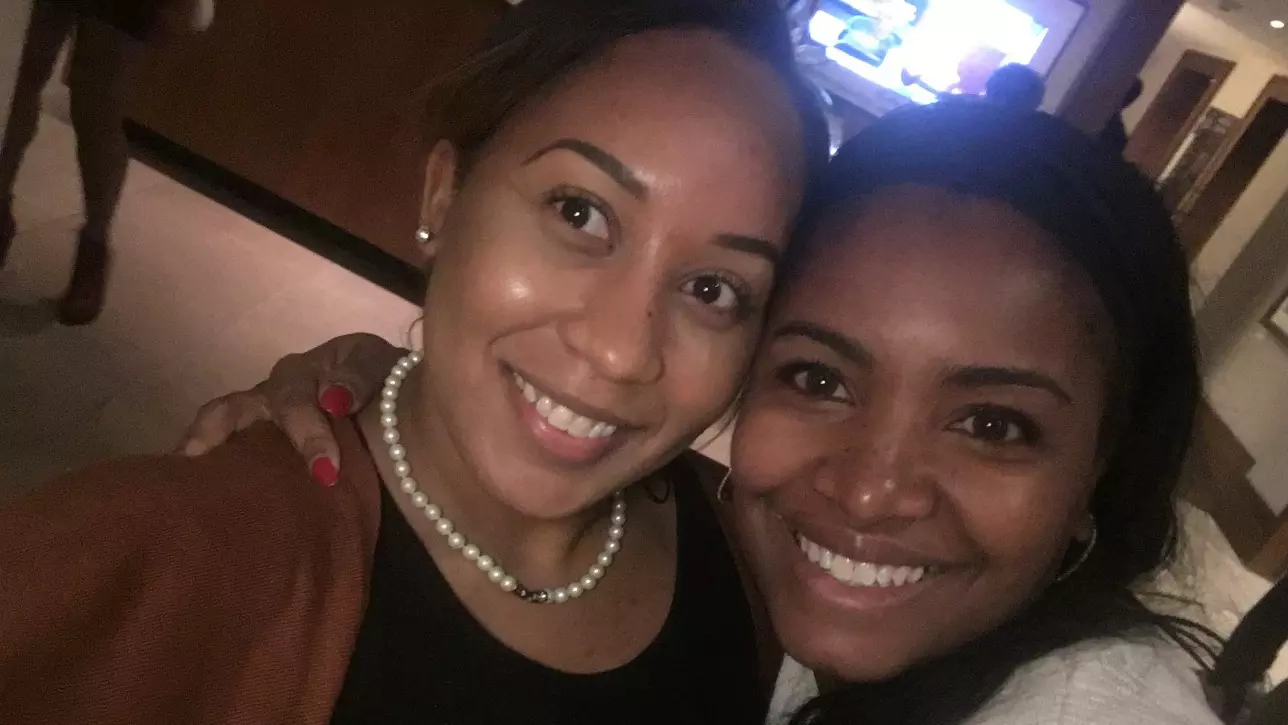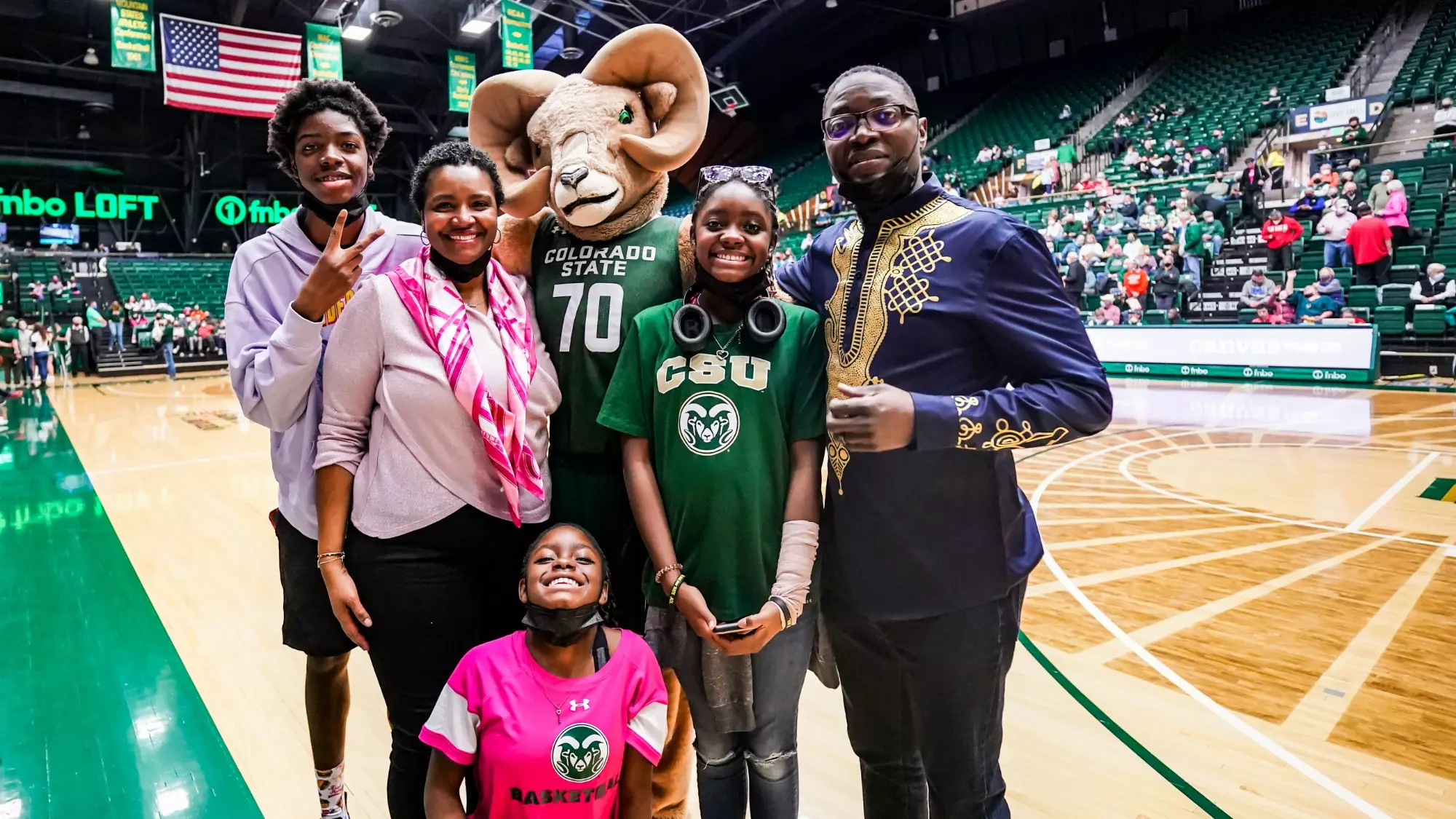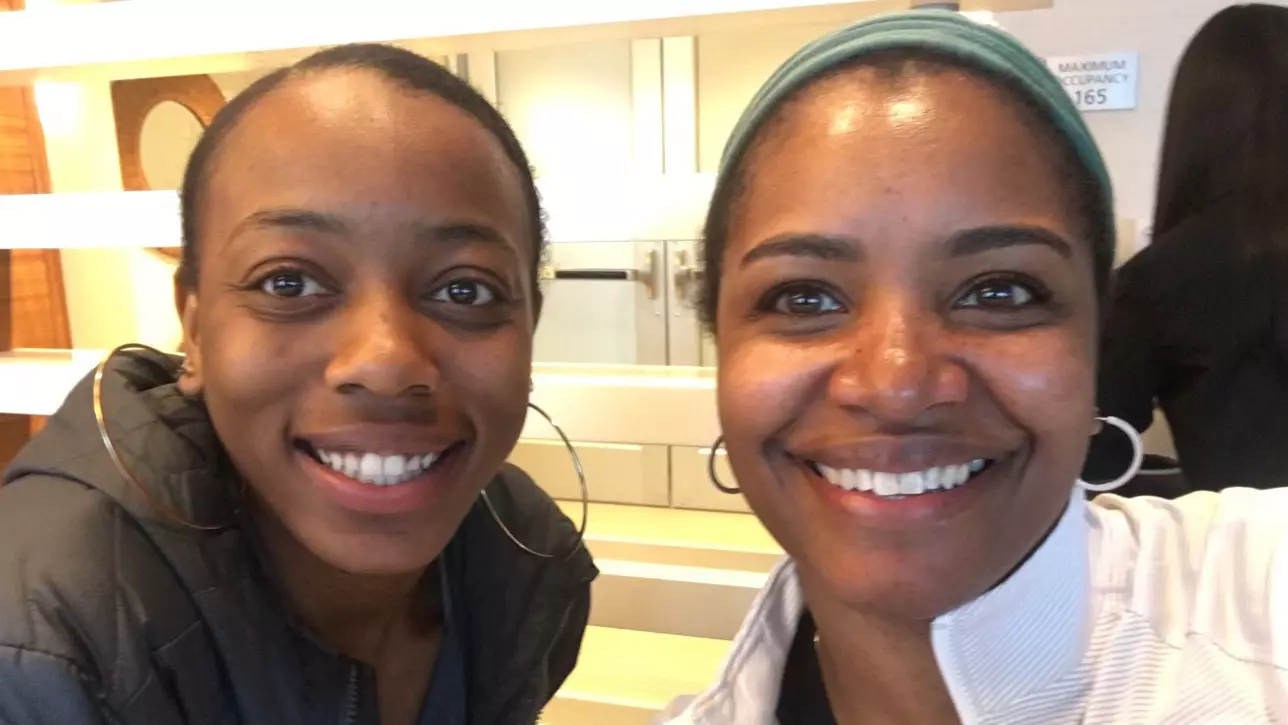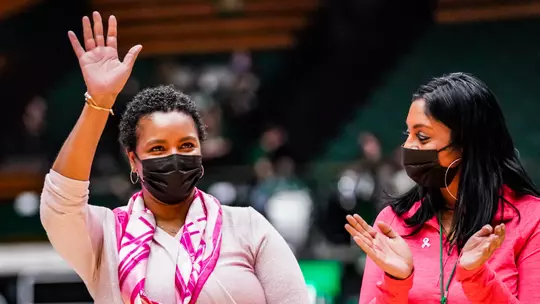
Doing the Work All Along
Mbadinga-Nzamba's many hats worn at CSU have her prepared for new role
Mike Brohard
Her starting point is perfect for her new position.
Skip past the fact Kim Mbadinga-Nzamba has been trained to step into the position of the Athletic Diversity Inclusion Directors (ADID) role within Colorado State’s Athletic Department. She worked with Albert Bimper for years, the original diversity director in an athletics department in the country when Colorado State hired him into the role in 2013. You can keep in mind she’s been a student-athlete at Colorado State, a coach, an academic advisor and Bimper’s assistant.
Those are all important aspects as she enters the office. More important is her humility. She will tell you she doesn’t have all the answers. What she will do is take part, if not start, all the conversations necessary.
“She’s grown because she’s willing to ask questions. And in an area where language evolves, even though you think you’re leading in the space, you have to be willing to ask questions,” Bimper said. “At any one moment it evolves, and you as the leader of the organization have to help and articulate how we evolve with that. I think her ability to ask questions will serve her well, as it already has.”
Mbadinga-Nzamba is good at asking questions. She’s been doing it for years. As a black, female athlete coming to Fort Collins. Later as a coach recruiting other black, female athletes to join the program. As a professor, guiding students in a classroom. As an academic advisor helping student-athletes navigate through a plethora of problems, in their coursework and in their lives.
She has had many of them do what she did, introductions which helped shape her life. She met Blanche Hughes, currently the Vice President of Student Affairs. She met with people and spent time at the Black/African American Cultural Center on campus.
“I was telling her as I saw her transition into this new position, she was already doing this work as a coach,” said Ajhanai Keaton, now an assistant professor at the University of Louisville. “The support she provided for me, thinking through just my transition as a black female athlete in Fort Collins coming from the Bay Area, it was shocking. Shocking in a good way. Fort Collins will always be a place I perceive as home.
“Just the challenges of what does it mean to create community on our team. Our team was diverse in a plethora of ways. Thinking about her positionality in my life it was really critical, because at that juncture of who I was to think through these issues for myself, so leaning on someone and have someone think about the complexities of my identity as a college athlete at CSU was immensely important to me. I’m not surprised at all to see her transition into this at this time in her career.”
Back then, there was the Vice President for Diversity Office, since changed to the Office for Inclusive Excellence. There was talk of diversity, equity and inclusion, but they weren’t quite linked together. They were topics of inviting change.
Keaton has gone from standout point guard for the Rams to earning master’s and doctorate degrees studying how race and gender equity and inequities inform organizational leadership. She studies those in charge of DEI work across the country, and she’s impressed Colorado State is among the few universities in the country to have those doing the work in their administration and athletics buildings linked together in harmony.
It’s expanded and we have to continue to do the work. If we want inclusive excellence, that’s the key.Kim Mbadinga-Nzamba
Times have changed, and the work being done covers a much broader spectrum. Bimper knows when he was hired in 2013, the focus, especially from the outside world, was his work would be focused on race. His mind never was, nor ever will be, so narrow. He understood from the start the conversations were going to become broader as issues affecting students entered the public eye. This is the day and age where Mbadinga-Nzamba goes from assistant to leadership role.
“It’s grown from the original thought process, and entry point was to talk about race and sport, and there’s a lot of research and a ton of publications in regard to that,” she said. “As it’s still relevant, it’s expanded. Just using an industry term, “Intersectionality”. It’s a term that was coined by scholar Kimberle’ Crenshaw, on the bases of intersecting identities, or overlapping identities. You can fall into so many things who define who you are as a person. It goes beyond race, it’s ethnicity, it’s gender, it’s socio-economic status, it’s sexual orientation and one’s religious faith etc. There are several identities we can look at as far as what makes up a person. Although that’s where we started, and we did some work within athletics and as an institution, it’s expanding. I can’t think in terms of a singular identity. That’s probably where I felt more comfortable given my identities at one point. It’s expanded and we have to continue to do the work. If we want inclusive excellence, that’s the key.”
Bimper, now on main campus as the Associate Dean and Executive Director of Professional Master’s Programs, sees only benefits from Mbadinga-Nzamba’s offices being tied to the OIE office. She agrees, feeling it will only open up more conversations and give her more backing in the program’s she’ll eventually pursue. And Shannon Archibeque-Engel, the Associate Vice President for Inclusive Excellence is intrigued by the perspectives Mbadinga-Nzamba has already shared.
“I love working with Kim. She brings a really positive attitude and a unique perspective since she’s worn so many hats within athletics,” Archibeque-Engle said. “She understands the student-athlete experience at Colorado State University. As a former basketball player, as someone who has worked in the department supporting students in SASS, she has a unique lens to support student-athletes, coaches and staff in athletics few people could bring to the job.”
Keaton could not agree more. Her research centers on DEI departments and those who lead them, and the truth is those conversations are centered on enhancing the athlete experience at campuses nationwide. Those directors are devising programming to help those in leadership roles, and the front line in athletics are coaches.
They are starting to seek direction on how understand and connect to the wider scope of athletes they bring in, not just from around the country, but around the globe.
“I think there are two critical aspects. I think her tenure as a coach, I think she’ll have a unique ability to connect with coaches given the time demands of coaching and the stressors of coaching,” Keaton said. “I think she’ll have the unique ability to speak with coaches on where DEI manifests on their team and what it looks like for recruiting and retention. I think she’ll be able to connect with coaches on encouraging them to be part of these programs and why it’s so critical for the wholistic development of their college athletes.
“I had a great career at CSU, and we were successful, but sport ended for me when I graduated. I think she’ll have the ability to bring and center that for coaches on why participating, particularly in these affinity-grouped type of programs we’ve had over the years for female student athletes and black student athletes, she’ll be able to speak to coaches about the importance of them. Her ability to communicate with empathy and understanding is also going to make her very successful in this position. My research studies these positions and one thing they struggle with is how do you communicate a message or an agenda that gets people to see structures and barriers when they’re so unseen to many oftentimes. I think her ability to communicate and center herself as, hey, I’m somebody who’s supposed to disrupt, but I’m not disrupting to call you out, I’m disrupting to call you in and create a stronger organization.”
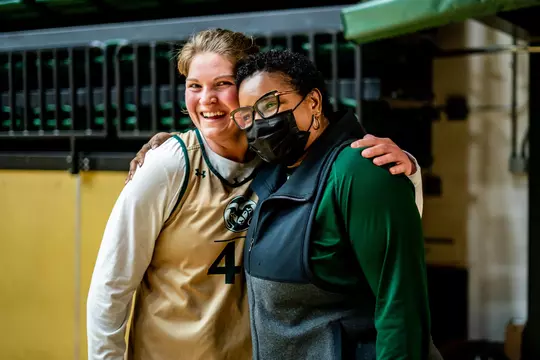
Mbadinga-Nzamba is currently working on an 18-month plan for her office, one which will eventually be followed with another of the same length. She joked it is not a project one does over the weekend, and she’s being very precise about the goals for the department and how they are structured to be met.
That, she said, is part of her DNA as a former athlete, the drive to put in the work, to come up with a plan and then execute it with precision. Practice makes perfect, and at the base of all she will try to accomplish will require conversation.
She will reconnect constantly with the groups who have helped her so much through all of her years on campus, as well as those she’s helped mentor. Most important are those who can help her understand the areas she’s not as polished.
She’s not out to change minds, but rather open them.
“I think that’s where we need to start. We need to meet people where they’re at,” she said. “This never should be a forced thing. I don’t want to be forced to think any one particular way. Let’s embody, literally, our principles in athletics – to educate, engage and excel. That is relevant in DEI work in so many different way, and I think it’s perfect that is our mission.
“If we can be openminded to listen, to educate yourself just a little bit more than you were before, then doesn’t that make you a better person? Maybe one day you have an interaction with somebody at some point, and maybe feel you can engage in a conversation around this if it comes up, that you hadn’t had before. There will be times when we want to educate historically on stories and lives of certain marginalized people and also will need to be better about equity and more opportunities for people in leadership roles. I think there’s no one-size-fits all way to approach it. I really feel like it has to be case-by-case, situation-by-situation. For some people, that’s a lot of work, but when you’re dealing with people, it’s supposed to be, because we are complex.”
What fills her with hope are the changes she’s seen in the peer group she was once part of the student-athletes who fill the locker rooms on campus, the areas which are among the most diverse. Every topic under her umbrella can be found in those areas.
What she’s seen is a willingness to enter the conversation and listen. More to the point, they’re prepared to act.
“When you peel back the onion, there are so many layers to this which can be beneficial to everyone. This group of students we’re working with, I feel these days, are so much more aware of that,” she said. “They see it. It’s not necessarily the students of marginalized identities who are saying, ‘hey, we should hear the perspectives of these people.’ It’s the white students telling me this, that they need to hear more perspectives. It’s students from other backgrounds who are advocating for other people’s voices who are not in the room. I’m extremely encouraged by that.”
Mbadinga-Nzamba said the underlying hope of all of those working in DEI is one day they will not be needed. It is their version of utopia, on their home campuses, the communities which surround them, the businesses interacted with and the populations they serve.
In the meantime, her goal is rather simple in serving the university she’s called home and the office she now occupies. It’s an homage to those who came before her and desire for those she’s committed to serve.
“It sounds so cliche, I literally just want to leave it better than I found it,” she said. “It’s this role. I would love to be here for the next 15 years, but we don’t know what’s going to happen. I’d love to leave it in a space where this role continues to have great relationships with our campus partners of this institution, and CSU and Fort Collins community.”
To do so will be willing to ask of herself what she will ask of others – to engage in the conversation and educate herself in ways which lead to a greater understanding.

